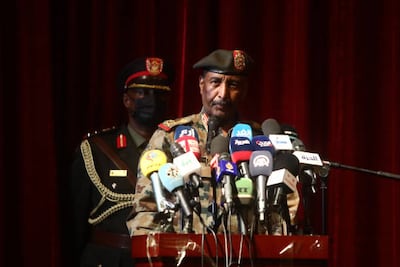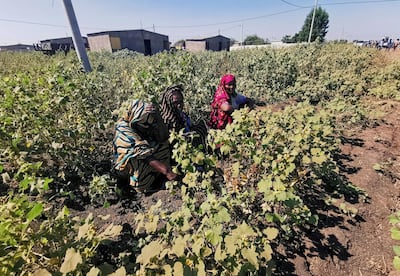Sudan's leader Gen Abdel Fattah Al Burhan took an uncompromising stand on Monday on his country’s border dispute with Ethiopia, vowing to wrest back control of areas still held by its neighbour along their porous border.
“The entire area must return to our control," Gen Al Burhan said in a speech at Al Fashaqa, a fertile border enclave inhabited by Ethiopian farmers protected by troops and militiamen for decades before Sudanese troops removed many of them late last year following a series of deadly clashes between the two sides.

“We are capable of regaining what is ours. There are no trade-offs when it comes to this,” Gen Al Burhan said to a gathering of several hundred troops and local residents.
"We pledge before you, residents of this area, that God willing, we as Sudanese and as a government will stand by you until we develop it and turn into a food basket that feeds all of Sudan,” he said of Al Fashaqa.
Settling the dispute through diplomacy, he said, was a possibility because Ethiopia is a “friendly neighbour”.
Ethiopia rejects the argument that Al Fashaqa is Sudanese territory and has accused Sudan’s military of stoking the dispute for the benefit of its ally, Egypt.

Sudan and Egypt are locked in a long-running dispute with Ethiopia over a hydroelectric dam Addis Ababa is building on the Blue Nile barely 20 kilometres from the Sudanese border.
Relations between Ethiopia and Sudan have also been damaged by the conflict in Tigray, the northern Ethiopian province where civil war broke out in November when federal troops, allied Eritrean forces and militias moved into the area to quash separatist rebels.
The conflict has forced tens of thousands of Ethiopians to flee and find refuge across the border in Sudan, which feared a spillover from the war in its neighbour.
However, an offer of mediation by Sudanese Prime Minister Abdalla Hamdok was harshly rejected by Addis Ababa, which said Sudan could not be trusted as an honest mediator, a rejection that angered the Sudanese government.
“As a nation, we will be the first to be impacted if a next-door nation of 110 million people collapses,” Mr Hamdok told a news conference on Sunday night. “We are neighbours. We cannot see a fire raging at our next-door neighbour and do nothing about it.”
He sought to downgrade the significance of last week’s recall to Khartoum of the Sudanese ambassador in Addis Ababa and said the envoy held consultations in Khartoum then returned to his post in the Ethiopian capital.
Ethiopian Prime Minister Abiy Ahmed’s government is under immense international pressure over allegations of war crimes by troops and allied militiamen in Tigray, where the rebels have reversed the course of the war, seizing control of the provincial capital and threatening to carry their offensive beyond the region.
The government is also facing growing unrest in other parts of the ethnically and religiously diverse country that could lead to serious unrest.
“We simply cannot allow the state to disintegrate in Ethiopia,” Mr Hamdok said.


